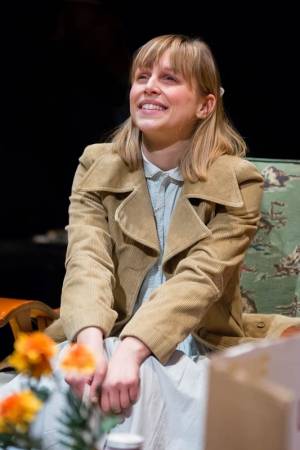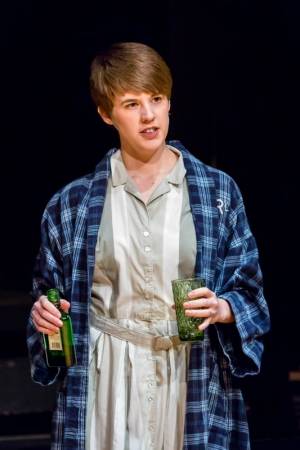The title The Effects of Gamma Rays on Man-in-the-Moon Marigolds may seem like an unusual name for a play, but when I saw that it was written by Paul Zindel, to me, it suddenly made sense. A science teacher, playwright and novelist, Zindel’s work has a prominent place in my formative years due to his penchant for long and odd titles attached to novels with unhappy, sloppy endings. Aside from that, discovering that Latrelle Bright, a new-to-the-Station but veteran director, producer, and writer was going to be at the helm of this production made it shoot to the top of my must-see list.
Luckily, I was able to secure an interview with her regarding this work and her perspective on it.
 Smile Politely: Most of the plays in the Station’s 44th season are new, or lesser-known. Marigolds seems to fill a perceived need for both a “classic work” and an award-winner, having won the Pulitzer in 1971. How did the play first come to your attention, and what about it appeals to you?
Smile Politely: Most of the plays in the Station’s 44th season are new, or lesser-known. Marigolds seems to fill a perceived need for both a “classic work” and an award-winner, having won the Pulitzer in 1971. How did the play first come to your attention, and what about it appeals to you?
Latrelle Bright: It’s been on my list for about 20 years now. I’m a big fan of coming of age stories (The Bluest Eye, A Tree Grows in Brooklyn, The House on Mango Street) and this fits neatly into that genre. A deep interest I have in stories is about how we survive one another.
Pictured below, Aubrey Helene as Tilly.
 SP: While the Pulitzer is a badge of honor that stays with a play throughout its creative life, and the descriptor is great for promoting the play, when juxtaposed with such new works being staged this season, one wonders if it might not seem as relevant. What about the play, in your opinion, speaks to a modern audience? Actually, is that even necessary: to you, does a play have to be timely to be good?
SP: While the Pulitzer is a badge of honor that stays with a play throughout its creative life, and the descriptor is great for promoting the play, when juxtaposed with such new works being staged this season, one wonders if it might not seem as relevant. What about the play, in your opinion, speaks to a modern audience? Actually, is that even necessary: to you, does a play have to be timely to be good?
Bright: What about this play speaks to a modern audience? Being human is what it is. What I find particularly interesting about this play set in 1964 when a 40something mom is watching her daughters grow up in a time very different from her own — is how envy works. Generally, I think there’s a mother/daughter thing that happens as most daughters are becoming women as their mothers are reaching or going over “the hill”. Add a changing world outside of the home which is never mentioned in this play… but you say “set in 1964” and if you were paying attention in history class you know this was a phenomenal time of change and disruption. The disruption in the house is Tillie’s interest in something other than boys, marriage, homemaking… her interest in science and all of the possibilities that are ahead of her… the doors we know will be open for her.
SP: I know that you took a new approach to directing the play No Child… a few years ago, and you have created original theatre pieces in the past, as well as having worked with the Inner Voices Social Issues Theatre. How does that experience inform or change your process while working on a more “traditional” piece like Marigolds? Or perhaps does your process change the piece?
Bright: Not so much a new approach. The one-woman show was turned into a 16 character play. I didn’t do that. The playwright allowed it. For me, directing a play is a completely different process. After five years of creating new work, it was nice to start with a brilliantly structured script and to (just) guide actors to honesty. Does my process “change” the piece? Yes. My process and Aubrey’s process and Rachel’s process… A different cast at a different time in my life and the show would be different.
SP: These days appear to be bringing a lot of changes to the Celebration Company at the Station Theatre, not the least of which is having 5 of 7 plays directed by women, while some of the plays have been written by women, and others feature mostly female characters. Do you think this new trend will catch on, or is it a short detour on the Station’s route?
Bright: I don’t know if it’s a trend. I didn’t choose this play because it has five women in it. I chose it because I think it’s a compelling story that people could connect with. I think there are a lot of stories by or about women that people could connect with. But just like racism, our culture is infused with sexism. It is difficult to escape. When asked to hear the story of “someone else” we can be taken aback. We’re so used to white male lead and savior. I would love to see all theatres doing more plays by all kinds of people. I would love to see all kinds of directors directing all kinds of plays. No boxes, please.
SP: Speaking of changes, throughout my time in C-U, I’ve seen a lot of familiar names directing at the Station, as well as occupying the seats on the board. In one season, you’ve managed to do both for the first time in this venue (although you have plenty of previous experience at both). What’s it like to be a new director in such an established company?
Bright: I resigned from the Counseling Center (leading sponsor for Inner Voices) at the university last year and was prepared to be an individual artist for a while. I knew I’d have time on my hands and fellow theatre folk reached out and offered opportunities. Jeffrey Jenkins kept me on as an adjunct instructor and Thom Miller (a member of the Station Board) asked me if I’d like to submit my solo work for the season. The Station is pretty traditional when it comes to theatre so my solo piece didn’t fly but they asked if there were any plays I would be interested in directing so I submitted a few titles and they chose Gamma Rays. A new director in such an established theatre company? There are some titles I won’t be able to direct here because they’ve been done before. It’s my understanding they don’t repeat. But I get to submit what I want to work on – chosen or not, that’s not typical in my theatre experience.
Pictured below, Rachel Rayburn as Beatrice.
 SP: What has been your favorite experience in directing this cast, which happens to be the season’s predominantly-female production? Were there any significant challenges?
SP: What has been your favorite experience in directing this cast, which happens to be the season’s predominantly-female production? Were there any significant challenges?
Bright: It’s a cast of delightful people. When you get to hang with cool folks and explore a world/time/characters there’s not much to complain about. The real challenges are the challenges of being artists after hours for little or no money in a culture that loves to experience art but not pay for it… not a living wage anyway. We’re tired. We have other responsibilities and sometimes other priorities.
The Effect of Gamma Rays on Man-in-the-Moon Marigolds plays Thursday, December 3rd through Saturday, December 19th at 8 p.m. Weekday and Sunday shows are $10 and Friday/Saturday shows are $15. Reserve your tickets online or by calling 217-384-4000.
Images by Scott Wells.








